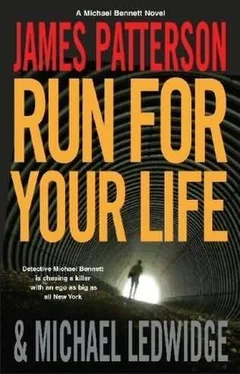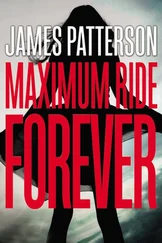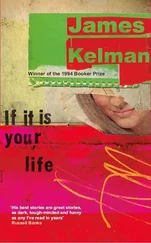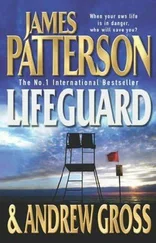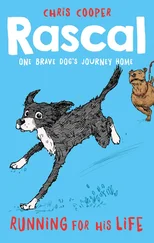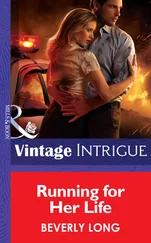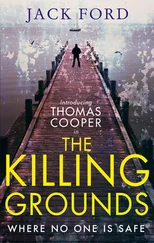His eardrums felt like they were bleeding from the thunder of the unsilenced.45, like a pack of cherry bombs had gone off inside his head. But a blizzard of endorphins whirled through his skull as well. What a rush! Like nothing in the world.
The train came to a shuddering halt, its doors opening automatically. A businessman waiting on the platform started to step into the car, but stopped dead at what he saw, then scurried away.
The Teacher was about to do the same, when a gunshot exploded behind him, and a stinging sound whipped past his left ear. He spun back around and stared in disbelief.
It was the lady cop. She was down on the floor of the train with Swiss cheese for a tummy, yet still trying to line him up in her shaking gun sights. What courage under fire!
“That’s magnificent,” he said to her sincerely. “You should get a medal. I’m really sorry I have to do this.”
He raised the.45 and aimed it at her terrified face.
“I really am,” he said, and pulled the trigger.
I couldn’t believe it! What the hell was going on in this world? As we were wrapping up the task force meeting, we got word that there’d been not one, but two more shootings in midtown. Preliminary reports said that a civilian and two transit cops had been shot, around Rockefeller Center, by the same assailant.
Our assailant. There wasn’t much doubt about it by now.
Even with my siren cranked, it took me most of forty minutes to get through the gridlock from headquarters to the frantic crime scene at 51st and Lexington.
Right off the top, it was impossible not to notice the NYPD chopper hovering above the Citicorp building. The throb of its rotors seemed to keep time with my heart as I waded through the crowd that was seething around a completely blocked-off 51st Street.
A sergeant let me under the yellow tape beside the 51st Street subway stairs. His serious-as-cancer face told me something I didn’t want to know. The echoing metallic squawk of police radios and sirens seemed to be coming from everywhere at once as I descended into the hot, narrow stairwell.
A train was stopped in the tunnel. There were maybe two dozen cops standing on the platform alongside one of the front cars. Inside it, I saw spent shell casings on the bloodstained floor. I could tell at a glance that several rounds had been fired.
The crowd of cops parted as a team of paramedics wheeled a stretcher out of the train car. Hats were quickly taken off. A hulking Emergency Service cop next to me blessed himself. When the stretcher neared, I followed his example, shaking my head hard to fight the sudden numbness in my chest.
The victim was the female rookie transit cop. All I knew about her was that her name was Tonya Griffith, and that she was dead. I couldn’t even see her face because of all the blood.
I asked another transit cop about Tonya’s partner, and found out that he was en route to Bellevue.
“Likely?” the big ESU guy inquired. As in, likely to die?
The transit cop didn’t answer. That meant, affirmative.
“Son of a bitch,” the ESU cop said, clenching his fists violently. “Son of a fucking bitch.”
I couldn’t have said it better myself.
Everything had changed from an hour ago. The shooter had killed one, probably two, of our own. The stakes had skyrocketed.
Now it was personal.
I followed the stretcher up to the street as the EMTs carried Tonya Griffith to an ambulance and put her inside. The driver slammed the rear metal doors, climbed in, and hit the roof lights. Then he seemed to think better of it, and turned them off before slowly pulling out into traffic. There was no rush on the way to the morgue.
As I watched the ambulance roll toward the Chrysler Building, I found myself thinking about taking that job at ABC. I’d had enough of shootings and death. At least, that was sure how I felt at that moment.
Detective Terry Lavery came stomping up the stairs behind me.
“Just spoke to the precinct captain, Mike,” he said. “The shooter disappeared. They scoured the area under- and aboveground, stopped buses and taxis on Lex and Fifty-first, but not a trace.”
The ESU cop had said it all. Son of a bitch.
“Witnesses?” I said.
“About a dozen. Mostly they glued themselves to the car walls when the shooting started, but their descriptions match closely. Tall Caucasian male with black hair and dark sunglasses, wearing jeans and a graffiti T. He actually used two guns, a.45 and a.22. One in each hand like Jesse James.”
I shook my head in amazement. One man takes down two trained, armed officers at the same time, with two different guns? Outside of a spaghetti western or a John Woo movie, that didn’t happen. Drawing, aiming, and shooting with just a single weapon while under fire took an incredible level of skill and training.
“This guy’s either got some kind of special ops military background, or he’s the luckiest idiot in the world,” I said. “Let’s pray it’s the latter.”
“Oh, and get this,” Lavery said. “He yelled out that he liked cops, right before he opened up on them. Tried to warn them off, even apologized to Tonya Griffith.”
Christ, on top of everything else, he was a cop lover?
“With friends like that, who needs enemies,” I muttered. “Okay, round up any video you can get from the transit booth or the street. I’ll head over to the other crime scene.”
As I walked to the corner, I saw an old Jamaican hot dog guy behind the tape waving at me. I changed direction and went to him, thinking he might have some information, but it turned out he was just handing out free water and sodas to all the responding emergency personnel.
“My daughter’s an EMT in the Bronx, mon,” he said with a contagious grin. “Least I could do for all you good folks.”
He refused to take my money, but finally accepted the PBA card I gave him. Maybe it would get him out of a ticket.
As I went through the familiar ritual of looking for my car, it struck me that every time I was ready to throw in the towel as a cop, I bumped face-first into the reason why I did what I did.
The Platinum Star Hotel was just five blocks west on Sixth. Rolling over there, I constructed a mental outline of my impressions so far.
The most obvious pattern emerging was that after each murder, the killer hid out, then popped up again – wearing different clothes – and committed another murder. He must have a hiding place somewhere in the area. An apartment? A hotel room?
Then there were the words he’d yelled, according to witnesses, about liking cops. Maybe that was just raving. But as cool and organized as this guy was, I had the feeling he knew what he was saying. He’d shot them only because he felt he had to, in order to escape.
That meant he wasn’t just out killing randomly – he was choosing his targets. Further, the Platinum Star Hotel was the third high-end establishment out of three.
My early guess was looking strong. He had an agenda, and it had something to do with wealth.
And unlike typical serial killers, this shooter didn’t operate in secret. He worked in broad daylight, and let himself be seen. Was he trying to send a message? Those kinds of guys were usually out to prove that they were smarter than the police. They wanted to taunt us, let us know that they could kill with impunity and never be caught. So why hadn’t he contacted us or the press?
That was as far as I’d taken those thoughts when I pulled up in front of the hotel.
At least a hundred cops were milling inside a crooked yellow line of crime scene tape that threaded two full city blocks around the hotel. Office workers on the other side of it just stood there, silent and gaping, shell-shocked, braced for whatever was going to happen next. I found myself actually preferring the manic looky-loo curiosity that was the usual at crime scenes.
Читать дальше
